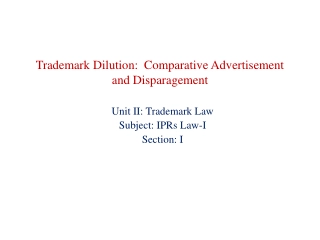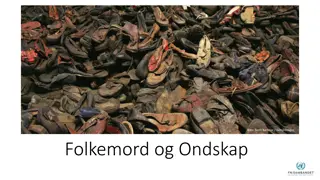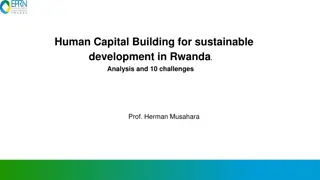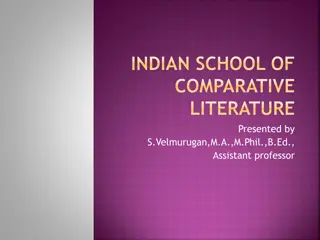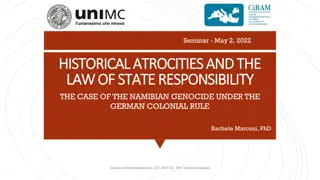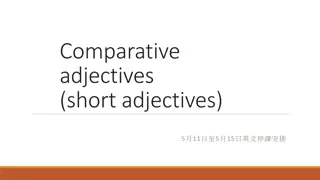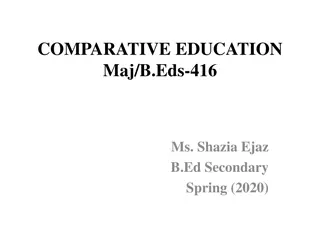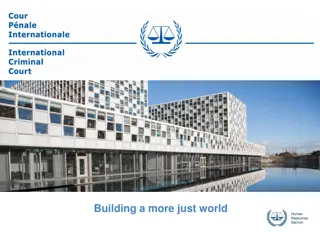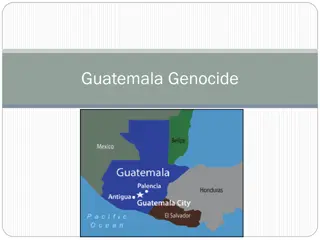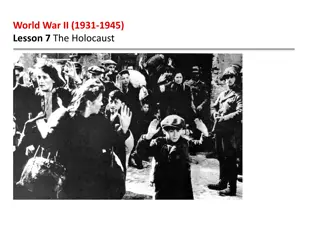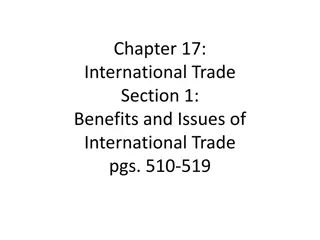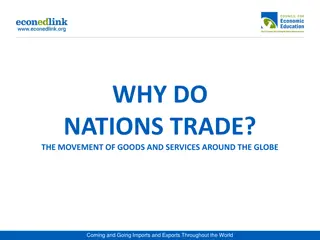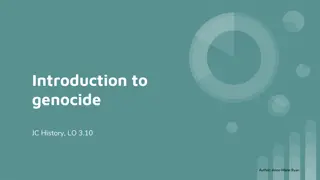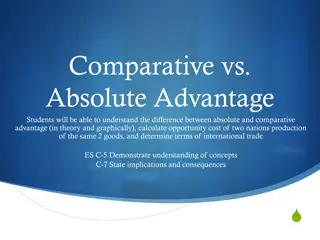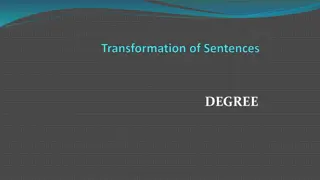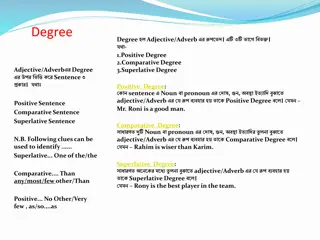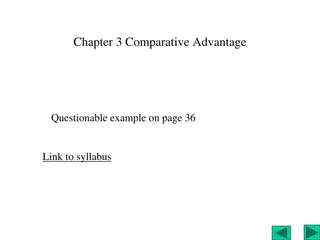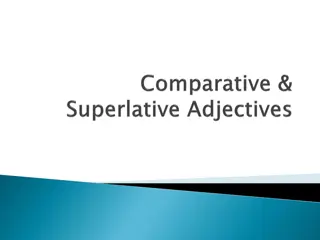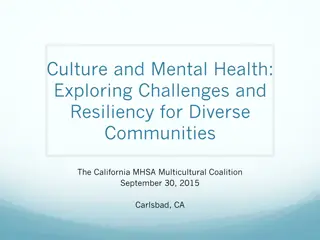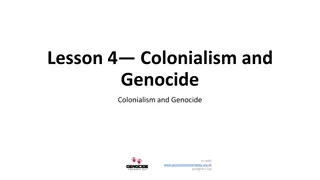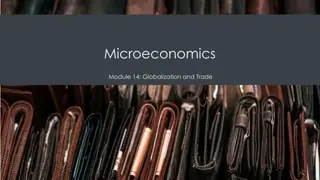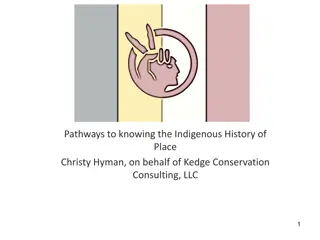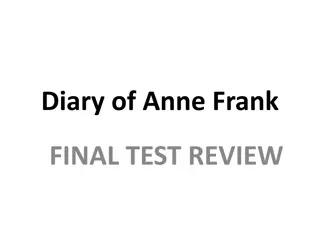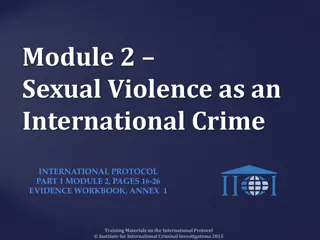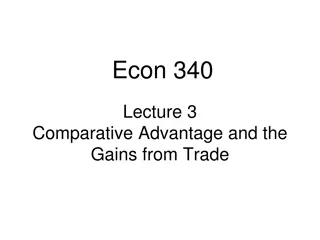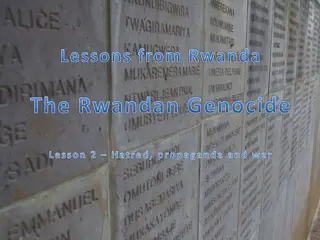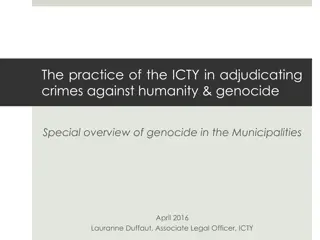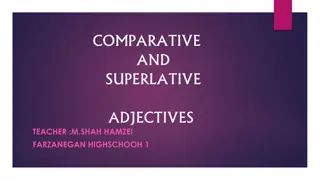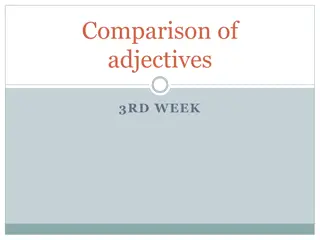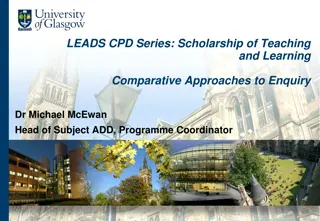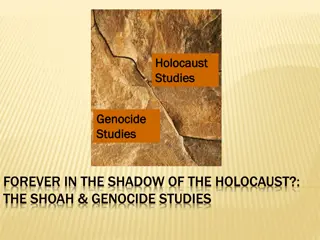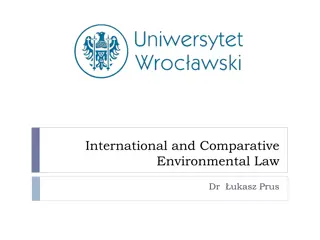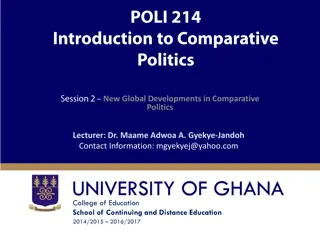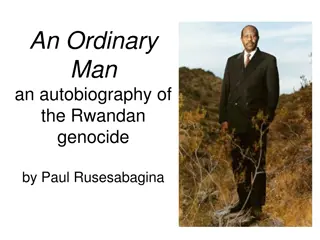Trademark Dilution and Comparative Advertisement
Trademark dilution and comparative advertisement in trademark law. Understand the grounds for trademark infringement and the elements needed to establish dilution or disparagement. Explore the importance of protecting registered trademarks and the limitations of comparative advertisement.
0 views • 6 slides
Comparative Analysis of Positive Charge's Charging Stations Evolution
This PowerPoint template example created by Romy Bailey for Positive Charge showcases a comparative study of high-speed charging stations versus traditional charging stations, along with a comparison of past year versus current year data, and a year-over-year analysis of Positive Charge's growth. It
1 views • 6 slides
Comparative Sociology
Comparative Sociology is a specialized branch that compares societies to provide generalizations, focusing on the structure and jurisdiction of groups and organizations. It involves studying affinities and disparities to predict outcomes. The discipline is closely related to Social Anthropology. Com
3 views • 15 slides
Understanding Genocide: Connection Between Ethnic Cleansing and Evil
Explore the concept of genocide, as defined by the UN, through historical events like the Armenian Genocide and the Holocaust. Delve into the depths of evil and its association with acts of genocide within societies, touching upon the banality of evil and the systematic eradication of entire groups.
2 views • 10 slides
Human Capital Building for Sustainable Development in Rwanda: Analysis and 10 Challenges by Prof. Herman Musahara
This analysis by Prof. Herman Musahara delves into the significance of human capital building for economic growth and development, especially in post-pandemic recovery periods. It highlights Rwanda's strides in human development post-genocide while noting existing challenges like child stunting and
1 views • 24 slides
Insights into the Indian School of Comparative Literature: A Comprehensive Overview
The Indian School of Comparative Literature, pioneered by Dr. Buddhadeva Bose in 1956 at Jadavpur University, plays a crucial role in studying the diverse languages and rich literary traditions of India. This academic discipline has grown significantly, with a focus on French symbolist poetry's infl
3 views • 14 slides
Historical Atrocities and State Responsibility: Namibian Genocide Seminar
Explore the legal analysis of the Namibian Genocide under German colonial rule, focusing on international responsibility and reparations. Delve into the historical background, negotiations, and the 2021 Joint Declaration between Germany and Namibia regarding the atrocities. Understand the events fro
1 views • 23 slides
Comparative Adjectives: Short Adjectives and Usage
Comparative adjectives are used to compare two things, such as the length, size, or appearance. They can be formed by adding -er to short adjectives like big, long, thin, short, and pretty. When the adjectives end in -y, change the -y to -i and add -er. Use "than" to compare two things in the same s
5 views • 10 slides
Understanding Comparative Education: Scope and Aims
Comparative education involves studying educational theories and practices across different countries to analyze the relationship between education and society. It aims to explain educational systems, aid in the development of institutions, and form generalized statements applicable in various natio
0 views • 31 slides
Understanding the International Criminal Court: Mission, Structure, and Impact
The International Criminal Court (ICC) was established in 2002 with the mission to end impunity for the most serious crimes affecting the global community. Through investigations, prosecutions, and trials, the ICC addresses crimes such as genocide, crimes against humanity, war crimes, and the crime
1 views • 22 slides
Genocide in Guatemala: Tragic History and Pursuit of Justice
The Guatemala genocide, perpetrated by military dictator Rios Montt, inflicted horrific atrocities on the indigenous Ixil Mayans from 1982 to 1983. Massacres, torture, and displacement marked this dark chapter. Despite international condemnation and legal actions, justice remains elusive.
0 views • 7 slides
Understanding the Horrors of the Holocaust in World War II
Explore the dark period of World War II with a focus on the Holocaust, tracing its roots, progression, and impact. Delve into Hitler's campaign against the Jews, his final solution, and the establishment of Nazi death camps. Learn about the devastating consequences of genocide, the United States' re
0 views • 18 slides
Understanding International Trade: Benefits, Specialization, and Comparative Advantage
International trade involves benefits and issues, with specialization playing a key role in driving economic patterns through resource distribution. David Ricardo's theory of comparative advantage revolutionized trade by focusing on producing goods efficiently. Absolute advantage and comparative adv
0 views • 12 slides
The Importance of International Trade: Benefits and Comparative Advantage
Nations engage in trade to exchange goods and services across borders, benefiting from comparative advantage to produce efficiently. Comparative advantage theory highlights the efficiency gains when each nation focuses on what it does best. Importing and exporting goods and services allow countries
0 views • 10 slides
Understanding Genocide in the 20th Century: Important Lessons and Research Tasks
Explore the concept of genocide through examples from the 20th century including Germany, Cambodia, Bosnia, Rwanda, and Armenia. Activities such as mapping genocides, researching case studies, and creating a timeline provide in-depth insights into this dark chapter of human history.
0 views • 10 slides
Understanding Comparative and Absolute Advantage in International Trade
Understand the concepts of absolute and comparative advantage through theory, graphical illustrations, and opportunity cost calculations for two nations. Explore the implications and consequences of these concepts in terms of international trade. Specialization, division of tasks, and gains from tra
0 views • 15 slides
Examples of Superlative and Comparative Forms
The content includes examples of superlative and comparative forms, along with positive constructions. Images are used to illustrate each example, making it easy to understand the concepts. Different scenarios are presented to demonstrate the usage of superlative and comparative adjectives in senten
0 views • 42 slides
Understanding Degrees of Adjectives and Adverbs
This content explains the concept of positive, comparative, and superlative degrees of adjectives and adverbs in English grammar. It provides rules and examples for transforming positive into superlative, positive into comparative, comparative into positive, comparative into superlative, and more.
0 views • 8 slides
Understanding Comparative Advantage in Economics: Adam Smith and David Ricardo
Explore the concepts of absolute advantage versus comparative advantage as discussed by renowned economists Adam Smith and David Ricardo. Discover how free market principles, self-interest, and efficient resource allocation shape beneficial economic decisions. Delve into examples of comparative adva
0 views • 13 slides
Comparative and Superlative Adjectives Usage Guide
Discover how to form and use comparative and superlative adjectives to compare two or more nouns. Learn the rules for adding -er or -est endings, using "more" or "most," and irregular adjectives like "good" and "bad." Follow step-by-step formulas to create sentences with comparative and superlative
0 views • 11 slides
Armenian Community in the United States: Challenges and Resiliency
The Armenian community in the US reflects a diverse background shaped by historical events like the Genocide. Despite facing challenges such as immigration waves and trauma, Armenian organizations strive to provide crucial services amidst growing population estimates. Key informants shed light on cu
0 views • 11 slides
Colonialism and Genocide: Impact of Divide and Rule in Rwanda
Colonialism in Rwanda exploited existing divisions between the Hutu and Tutsi, leading to heightened tensions and manipulation by the colonial government. This ultimately contributed to the genocide in Rwanda, which was not a sudden event but the culmination of years of historical tensions and explo
0 views • 12 slides
Comparative and Superlative in Pennsylvania Dutch 101
Covering the formation of comparative and superlative forms in Pennsylvania Dutch (PD), the content explains how PD adjectives add endings and change stem vowels to express comparison. It discusses irregular adjectives and provides examples to practice forming comparative forms in PD phrases.
0 views • 11 slides
Insights into Genocide and War Crimes in the Former Yugoslavia
Explore the harrowing events surrounding the genocide in Srebrenica, as well as the ICC statute defining genocide. Witness the testimonies of individuals like Drazen Erdemovic and Dragan Obrenovic, shedding light on the atrocities committed during the Yugoslav Wars. Delve into the plea of guilty, re
0 views • 31 slides
Comparative Law: Research, Analysis, and Resources
Explore the world of comparative law through research and study of legal systems, including Italian and foreign laws. Delve into comparative legal analysis, characteristics of legal systems, and the study of legal sources. Discover in-depth insights from a variety of books and academic journals, as
0 views • 36 slides
Understanding Globalization, Trade, and Comparative Advantage in Economics
Globalization and trade play a crucial role in the interconnected world economy. This module explores the gains from international trade, barriers to trade, costs of globalization, and the concepts of absolute and comparative advantage. Absolute advantage is when a country can produce a good using f
0 views • 27 slides
Understanding the Impacts of Colonialism on Indigenous Communities
The article delves into how East Coast Indigenous communities were profoundly affected during the colonial period and beyond, enduring forced removals, enslavement, attempted genocide, and subjugated statuses. It explores the historical realities that continue to shape the presence and representatio
0 views • 18 slides
Review of "Diary of Anne Frank" - Final Test Overview
In the final test review of "Diary of Anne Frank," key events are organized in chronological order, vocabulary related to the story is provided, and important themes such as persecution, genocide, and anti-Semitism are highlighted. The content explores the harrowing experiences of Anne Frank and her
0 views • 61 slides
Understanding International Crimes: Elements, Definitions, and Evidence
International crimes encompass acts like crimes against humanity, war crimes, and genocide, with various legal elements to establish accountability. To substantiate such crimes, individuals must prove contextual, linkage, and specific elements. Evidence of sexual violence is crucial in proving these
1 views • 20 slides
Understanding Comparative Advantage and Gains from Trade
In this lecture on comparative advantage and gains from trade, the concept of why countries trade, price differences, supply and demand, the Ricardian model of trade, identifying comparative advantage, and critiques of comparative advantage are discussed. The benefits of free trade and how it leads
0 views • 53 slides
Lessons from Rwanda: Hatred, Propaganda, and War
Explore the dark era of the Rwandan Genocide, delving into the themes of hatred, propaganda, and warfare. Learn about the use of propaganda in influencing people and its impact during the conflict. Follow the timeline of events leading up to the genocide and the efforts for ceasefire amid escalating
0 views • 5 slides
Overview of ICTY's Adjudication of Crimes Against Humanity and Genocide
Explore the significant role of the International Criminal Tribunal for the former Yugoslavia (ICTY) in adjudicating crimes against humanity and genocide, focusing on the history, international crimes, specific trials, and achievements in bringing perpetrators to justice. The presentation provides i
0 views • 27 slides
Understanding Comparative and Superlative Adjectives: M. Shah Hamzei Farzanegan High School
Learn how comparative and superlative adjectives are used to compare objects in English language. Find out the rules to form the comparative and superlative forms of adjectives based on the number of syllables, spelling changes, and exceptions. Improve your English language skills with practical exa
0 views • 13 slides
Comparative and Superlative Forms of Adjectives in Latin Grammar
Exploring the declension patterns and irregular forms of comparative and superlative adjectives in Latin, including examples and comparisons with paradigms of different declensions. Learn about the nuances in the declining of 3rd declension adjectives and their comparative forms, along with exercise
0 views • 14 slides
Comparative Approaches in Educational Enquiry: A Scholar's Perspective
This session delves into the world of comparative research in education, exploring different settings and methodologies. Dr. Michael McEwan shares insights on Glassick's Framework for design and the importance of appropriate methods. Discover the essence of comparative research, including ex post fa
0 views • 18 slides
Forever in the Shadow of the Holocaust: The Shoah & Genocide Studies
Exploring the intertwined history of the Holocaust and genocide studies, this in-depth text delves into the etymology of genocide, the significant role of Raphael Lemkin, and the complex relationship between studying the Holocaust and other genocides. It discusses the nuances of comparing genocides
0 views • 17 slides
Comparative and International Environmental Law Course Overview
Explore the world of Comparative and International Environmental Law with Dr. ukasz Prus through in-depth examinations, take-home exams, and insightful discussions on topics such as environmental policy, law sources, and regional systems. Dive into the complexities of waste management, common legal
0 views • 102 slides
Global Conflicts and Revolutions: A Historical Perspective
The turbulent events of the 20th and 21st centuries, from the aftermath of WWI with the Treaty of Versailles to the devastating Rwandan Genocide in 1994, have shaped our world through wars, genocides, and ideological clashes. The rise of leaders like Hitler, the tragedy of Pearl Harbor, the Korean W
0 views • 7 slides
New Global Developments in Comparative Politics Since the 1980s
The lecture by Dr. Maame Adwoa A. Gyekye-Jandoh explores new global developments in Comparative Politics since the 1980s, covering topics like rapid industrialization in Asia and the collapse of communism in the Soviet Union and Eastern Europe. Students are introduced to key concepts such as the Com
0 views • 20 slides
Reflections on Rwanda: A Journey Through Genocide and Hope
In "An Ordinary Man: An Autobiography of the Rwandan Genocide" by Paul Rusesabagina, the harrowing events of the Rwandan genocide are vividly depicted. Explore the role of the United Nations, the deep-seated racial hatred between Hutus and Tutsis, and the brutal methods of extermination used. Paul's
0 views • 16 slides
